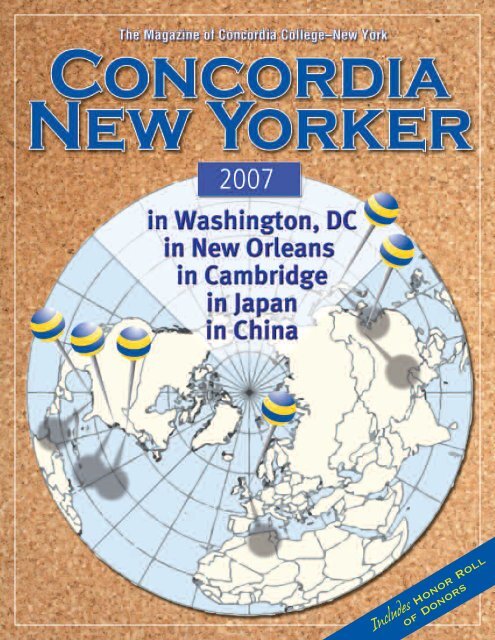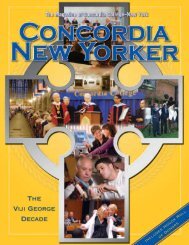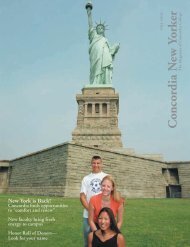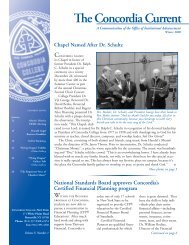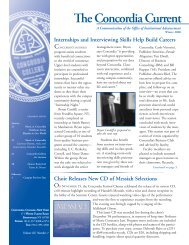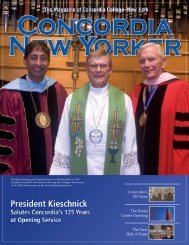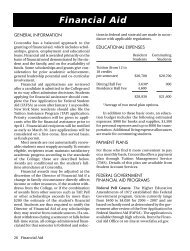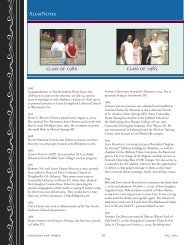Includes HonorRoll ofDonors - Concordia College
Includes HonorRoll ofDonors - Concordia College
Includes HonorRoll ofDonors - Concordia College
You also want an ePaper? Increase the reach of your titles
YUMPU automatically turns print PDFs into web optimized ePapers that Google loves.
<strong>Includes</strong> Honor Roll<br />
of Donors
CONCORDIA<br />
NEW YORKER<br />
2007<br />
Experiential & Service Learning<br />
Experiencing Empathy by Lending a Hand<br />
50th Reunion<br />
A time for long-time friends<br />
to gather once again to<br />
share and relive their<br />
<strong>Concordia</strong> experience.<br />
The City as Text<br />
New York City plays<br />
a major role in the<br />
development of<br />
<strong>Concordia</strong> students.<br />
<strong>Concordia</strong> In China<br />
This summer, an intrepid Clipper<br />
Crew headed to China<br />
2 CONCORDIA NEW YORKER | 2007<br />
AlumNotes<br />
4<br />
6<br />
8<br />
10<br />
11<br />
12<br />
13<br />
14<br />
15<br />
16<br />
18<br />
21<br />
32<br />
The <strong>Concordia</strong> Experience<br />
a recipe for success!<br />
The United Nations<br />
and <strong>Concordia</strong><br />
<strong>Concordia</strong> Helps Bronxville High<br />
Stem the Tide<br />
Dr. Loase studies <strong>Concordia</strong><br />
students for “Sigfluence”<br />
Clipper Tennis Continues to Serve Up Winners<br />
Men #1 in the East, Coach Tarangioli Coach of the Year<br />
Women’s Tennis Perfect in Conference<br />
Scholarship Established to Memorialize<br />
Rev. Theodore Wittrock<br />
Honor Roll of Donors<br />
Calendar of Events
CONCORDIA<br />
NEW YORKER<br />
2007<br />
Editor<br />
Charlie Browne<br />
Executive Editor<br />
Paul Grand Pré<br />
Contributors<br />
Patrick Bayens, Kate Behr, Robert Boehler,<br />
Craig Boston, Martin Conkling, Sheryl Donner,<br />
Kathryn Meyer, Kit Nagel, Mandana Nakhai,<br />
Peggy Rapp, Neil Tarangioli, Julie Taylor,<br />
Mindy Warnken, Andrzej Wlodarczyk<br />
Photographer<br />
Flladi Kulla<br />
Layout and Design<br />
Jill Weddall<br />
Moxie Create, Minneapolis, MN<br />
The <strong>Concordia</strong> New Yorker is published annually<br />
in the fall by the Office of Institutional<br />
Advancement for distribution to alumni, faculty,<br />
staff, students, parents, and friends of the<br />
<strong>College</strong>. <strong>Concordia</strong> <strong>College</strong>-New York is solely<br />
responsible for its content. ©2007<br />
Contact us:<br />
<strong>Concordia</strong> <strong>College</strong><br />
171 White Plains Road<br />
Bronxville, NY 10708<br />
phone: (914) 337-9300, x2167<br />
email: charlie.browne@concordia-ny.edu<br />
Alumni updates & other news:<br />
alumni@concordia-ny.edu<br />
mindy.warnken@concordia-ny.edu<br />
Address changes:<br />
julie.taylor@concordia-ny.edu<br />
Visit our website for more information about<br />
upcoming events: www.concordia-ny.edu<br />
A few words on<br />
As educators, we are always mindful of two outcomes: what is learned,<br />
and how it is put to use. It is often assumed that as a result of the educational<br />
experience, students will leave with more knowledge than they began. This<br />
“quantitative” measure is important and is often measured by standardized<br />
tests. Educational psychologists have maintained that this is only one measure<br />
of the learning process. Just as important, is assuring that what the students<br />
have learned has “real world” applications.<br />
It is this dual objective that has formed the development of the curriculum at<br />
<strong>Concordia</strong>. Recently, through a systematic effort by the faculty, <strong>Concordia</strong> has<br />
integrated an experiential learning component into its curriculum. Its intent is<br />
to provide a hands-on opportunity for the students to discover how knowledge<br />
gained in the classroom finds application in the world around them.<br />
The focus of this issue of the <strong>Concordia</strong> New Yorker is to demonstrate how<br />
these objectives are finding fruition in the lives of our students. Take for<br />
example the recent trip to China. It is becoming apparent that China and India<br />
are on a race to claim a greater role in the world economic order. Students had<br />
a unique opportunity to observe this competitive race unfolding. Such an<br />
experience enriches their learning immeasurably.<br />
As we move forward, the <strong>College</strong> intends to further this objective by<br />
strengthening the link between academic and student services. Such an effort<br />
stems from our belief that learning takes place both in and out of the<br />
classroom. Service learning activities, like the ones discussed in this issue, are<br />
being planned for the coming year to provide greater opportunities for our<br />
students.<br />
I am particularly proud of these accomplishments by our students. They will<br />
be better prepared as they leave <strong>Concordia</strong> to serve our church and society.<br />
Viji D. George, President<br />
CONCORDIA NEW YORKER | 2007<br />
3
THE CONCORDIA<br />
a recipe for success<br />
1<br />
2<br />
3<br />
4<br />
5<br />
6<br />
1 part <strong>Concordia</strong> Distinctive (core curriculum forming the foundation for<br />
critical thinking, problem solving, and communication skills)<br />
1 Program of Study (select from Biology, Business, Education, English,<br />
Liberal Studies, Social Sciences, and Social Work)<br />
Season abundantly with Elective & Support Courses<br />
Blend well with Experiential Learning (internships, study abroad, city-astext,<br />
dialogue outside the classroom, campus life experiences, volunteer<br />
work, clubs, and organizations)<br />
Bake in an environment brimming with professorial interest, diverse<br />
fellowship, and worldly awakenings<br />
Garnish with a Capstone Project<br />
Our unique curriculum—The <strong>Concordia</strong> Experience—<br />
pushes students beyond intellectual boundaries and<br />
takes their education into the world with<br />
Experiential Learning—internships, fieldwork, study<br />
abroad, city-as-text, and service learning. Every<br />
Matt Hass, ’08, North Haven, CT<br />
Liberal Studies – Biblical Languages/Religion,<br />
Pre-Seminary<br />
4 CONCORDIA NEW YORKER | 2007<br />
student engages in experiential learning as a<br />
graduation requirement, many of them taking<br />
advantage of what we consider to be our biggest<br />
classroom: New York City.<br />
Taking Theology Studies to Japan<br />
Matt Hass broke new ground this year as the first<br />
<strong>Concordia</strong> student to study as part of our exchange program<br />
with Japan Lutheran <strong>College</strong>, near Tokyo. He studied<br />
Lutheran theology with the college’s Religion faculty, was<br />
immersed in all aspects of Japanese culture, a guest in the<br />
homes of his classmates, and enjoyed many “memorable”<br />
dining experiences. As his semester drew to a close, he<br />
volunteered with the Youth Ministry, an LC-MS World<br />
Mission, and for the Lutheran Synod in Japan at an English<br />
language camp.<br />
While classes were taught in English, Matt knew that<br />
outside the classroom, language could be a barrier. Once<br />
there, however, he found his lack of Japanese added to the<br />
adventure. “Part of the experience was learning how to relate<br />
to people of another culture who spoke a different language,”<br />
commented Matt. “Some of my most enjoyable evenings<br />
were with people who spoke the least amount of English.”<br />
He recommends this or any study-abroad program to his<br />
classmates to “open doors you never knew existed”.
EXPERIENCE<br />
<strong>Concordia</strong>ns Jodi Ashton and Caroline Jose<br />
Caroline Jose, ’08, New Delhi, India<br />
Liberal Studies – History, Pre-Law<br />
Experiencing Law in Washington D.C.<br />
Through <strong>Concordia</strong> mentor Dr. Kathryn Galchutt,<br />
Professor of History, Caroline Jose attended The Legal<br />
Studies Institute—a one-week academic seminar designed<br />
to educate future law students about the political,<br />
economic, and moral challenges which they will face in<br />
law. Days were packed with seminars consisting of<br />
lectures given by lawyers and law school professors,<br />
mock-law classes, an introduction to the Socratic method,<br />
and tips on succeeding in law school. Each participant<br />
was assigned a young attorney mentor who could share<br />
thoughts about the law school experience and offer<br />
insights into the actual practice of law. Caroline found<br />
great benefit in this relationship as it provided “vast<br />
insight” from those who are relatively new to the field.<br />
“<strong>Concordia</strong> has provided me numerous ‘hands-on’<br />
learning opportunities and this is just one example. The<br />
tremendous support from faculty and staff, in addition to<br />
the campus environment, enables students to relax and<br />
excel in their academics.” When asked if she still plans to<br />
attend law school after a glimpse of “the real deal”,<br />
Caroline exclaimed, “Most definitely!”<br />
Maintaining the Integrity of a<br />
National Treasure<br />
Remy Borror interned seaside at the Statue of Liberty<br />
National Monument-Ellis Island Immigration Museum.<br />
Interested in teaching middle or high school history, she<br />
thought this would be a great opportunity for an aspiring<br />
historian. Where else can one obtain such in-depth<br />
knowledge of our country’s premier federal immigration<br />
station, the immigration process<br />
of the time, and the world<br />
events that shaped the history<br />
of this national gateway?<br />
Though Remy’s primary<br />
responsibility was working in<br />
the archives room, she also<br />
took from this experience<br />
some very practical<br />
knowledge—keeping a<br />
National Monument running<br />
well takes not only a<br />
dedicated staff, but also the<br />
support of public and<br />
private organizations to<br />
insure its integrity and to<br />
preserve the experience for<br />
generations to come.<br />
Sitting on the Court Bench<br />
In pursuit of her Education degree, Kadeen Berlin<br />
became interested in Educational Law. Combining this<br />
interest with a curiosity in the criminal justice system, she<br />
jumped at the opportunity of an internship with the<br />
Honorable Juanita Bing Newton, Administrative Judge for<br />
New York City Criminal Court.<br />
In a single day, her experiential<br />
learning ranged from sitting on<br />
the bench with a criminal court<br />
judge during arraignments to<br />
meeting with various judges<br />
and updating or creating<br />
agency-related policy and<br />
procedure manuals.<br />
As Kadeen prepares for<br />
law school in 2008, she rates<br />
this internship as a perfect<br />
“10”. “I have learned so<br />
much about the structure of<br />
the court system, as well as<br />
myself, and how I will fare<br />
in the work place,” said<br />
Kadeen, “In whatever area<br />
my law degree will be, my<br />
goals will be geared<br />
toward the betterment of<br />
the individual.”<br />
Remy Borror, ’08, Pound Ridge, NY<br />
Liberal Studies – History<br />
Kadeen Berlin, December ’07,<br />
Bronx, New York<br />
Education – Childhood<br />
Education/English Concentration,<br />
Fellows Program<br />
Continued on page 9<br />
CONCORDIA NEW YORKER | 2007<br />
5
THE CITY AS TEXT<br />
Going to the theatre is an integral part<br />
of the Modern Drama class. Typically, most<br />
students attend three or four plays a<br />
semester so they can see the theory and<br />
ideas discussed in class employed in front of<br />
an audience. New York City gives us access<br />
to a remarkable range of performances. We<br />
have seen some wonderful productions,<br />
some classic pieces, and some weird but<br />
provocative dramas. One of the most<br />
memorable was an eye-opening performance<br />
of Brecht's The Threepenny Opera.<br />
—Professor Kate Behr<br />
<strong>Concordia</strong>’s Expo Day is a unique<br />
opportunity for our students to “learn<br />
beyond boundaries”. Each fall, classes are<br />
suspended for a day as students and faculty<br />
head off campus for excursions taking<br />
advantage of the rich cultural, historical,<br />
business, and educational opportunities of<br />
6 CONCORDIA NEW YORKER | 2007<br />
Paul Davis, New York Shakespeare Festival, 1976<br />
At the Metropolitan Museum of Art:<br />
Greek and Roman Galleries, Bust of Caesar Augustus<br />
New York City plays a major role in the development of <strong>Concordia</strong> students. Going to “The City” for a museum<br />
visit, art exhibition, theatrical performance, ballgame, or exotic foreign food is part of what our students do.<br />
As experiential learning and internships become more essential components of a college education,<br />
<strong>Concordia</strong> has begun to take advantage of all The City offers to enhance its traditional classroom learning.<br />
So much of what is referenced in textbooks is happening just 25 minutes away: read about it…see it in practice!<br />
Very few colleges can offer such a rich array of real life.<br />
metropolitan New York.<br />
For Expo Day 2006, students walked the<br />
stage of the famous Apollo Theater in Harlem,<br />
visited a treatment center for traumatized<br />
children, and saw a particle accelerator in<br />
action. “It’s all about the experience,” comments<br />
Academic Dean Sherry Fraser: “Expo Day<br />
provides students the opportunity to discover<br />
the world is their classroom. It opens a window<br />
into the world of professionals, provides an<br />
opportunity for students to network and<br />
explore the New York metropolitan area. Texts<br />
are important, but seeing the pedagogy played<br />
out in real life experiences such as the work<br />
place helps students conceptualize the<br />
importance of the classroom experience.”<br />
Students from many disciplines joined the<br />
English Department faculty to visit 125th Street<br />
to experience the places, people, and literature<br />
of the Harlem Renaissance through art, music,<br />
poetry, film, and theatre. The day included a
The “Tree of Hope” at the Apollo Theater<br />
visit to the Schomburg<br />
Centre for Research in<br />
Black Culture and the<br />
famous Apollo Theater.<br />
—Professor Mandana<br />
Nakhai<br />
Growing international interdependence places serious<br />
pressures on college students to understand the dynamics of the<br />
evolving global economy, frequently rendering traditional<br />
textbooks quickly obsolete. New York City allows students a<br />
unique opportunity to work with those companies that allow<br />
learning opportunities. The <strong>Concordia</strong> Business Club plays a<br />
vital role in identifying alumni or friends of the <strong>College</strong> who can<br />
help develop corporate links and mentorships.<br />
Last year, students had an opportunity to visit a trading floor<br />
at Bloomberg L.P., the largest financial news and data company<br />
in the world. Students not only learned about the business of<br />
making money, but also gained appreciation of the role charity<br />
and philanthropy play in shaping the corporate image. Other<br />
visits have included CNBC headquarters, Goldman Sachs, The<br />
Federal Reserve Bank of New York, and the United Nations.<br />
Business courses are application-oriented. Frequently, students<br />
are asked to identify one or two companies and compare them<br />
using earlier pre-determined dimensions. Direct access to the<br />
companies located in<br />
New York City allows<br />
students to interview<br />
business leaders and use<br />
timely real-world<br />
examples to support the<br />
recommendations and<br />
hypotheses they propose<br />
as a result of their<br />
research.<br />
<strong>Concordia</strong> Business Club with CNBC’s<br />
Donny Deutsch<br />
—Professor Andrzej<br />
Wlodarczyk<br />
For our Social Work students, visiting New York City is<br />
the ultimate way to integrate theory with practice. They study<br />
the beginnings of social work (c. 1898) at Columbia University<br />
and begin to understand the historical significance of peoples’<br />
flowing in and out of The City. NYC has the history and current<br />
issues arrayed before our eyes…from the Tenement Museum<br />
and Ground Zero to the ethnic pockets of people in their very<br />
colorful neighborhoods. Social Work students utilize The City as<br />
Text with their field work assignments, which could be as many<br />
as three days a week during the school year. They could labor<br />
and learn at the Cabrini Adult Day Care facility or Bellevue<br />
Hospital Hospice in Manhattan, or work with persons in<br />
recovery at a Bronx Hospital.<br />
Students experience an interactive play with an immigrant<br />
(actor) at the Tenement Museum; visit Ellis Island, the American<br />
embarkation point of so many immigrants; observe people in<br />
their natural surroundings; and augment their education by<br />
tasting exotic ethnic foods.<br />
Meaningful, lifechanging<br />
experiences and<br />
a greater understanding<br />
and appreciation of<br />
people—their cultures,<br />
ethnicities, and races—<br />
occur when students see<br />
and experience society for<br />
themselves.<br />
—Professor Peggy Rapp<br />
During the upcoming spring semester, my Issues in the<br />
New Testament course will explore the gospels of Mark and Luke<br />
in their literary, social, and religious contexts. The course will<br />
take advantage of the stunning, newly-renovated Greek and<br />
Roman Galleries of the Metropolitan Museum of Art in<br />
Manhattan. After a detailed guided tour of the extensive<br />
collection, students will compare the claims and world-views of<br />
the Imperial, funerary, and domestic-religious iconography of the<br />
early Imperial Era with the narrative claims of Mark and Luke-<br />
Acts. Students will also utilize the Met’s incredible collection of<br />
Imperial Era art, including a colossal head of the first Christian<br />
emperor, Constantine the Great; four life-size busts and a cameo<br />
of Augustus; numerous sarcophagi and funerary urns; and<br />
several residential frescos from a villa near Pompeii.<br />
—Professor Patrick Bayens<br />
The Cloisters shows so much church history in the period<br />
included in my Scripture and Faith in Context (Church History)<br />
course. Students are advised to take a personal view of the<br />
sacramental vessels in the museum and relate it to the place of<br />
sacraments in medieval life.<br />
Additionally, regarding architecture and its revealing the<br />
character of a culture, students are<br />
referred to visit St. Patrick’s<br />
Cathedral, the commercial<br />
buildings in Manhattan, Grand<br />
Central Station, etc., as examples<br />
of how Americans from past<br />
centuries revealed their priorities<br />
and values in architectural style<br />
and function.<br />
The "Antioch Chalice", first<br />
half of the 6th century<br />
Byzantine; Made in Antioch<br />
or Kaper Koraon (?)<br />
The Cloisters Collection, 1950 (50.4)<br />
Typical 1900s tenement<br />
—Professor Martin Conkling<br />
C<br />
CONCORDIA NEW YORKER | 2007<br />
7
The United Nations<br />
and <strong>Concordia</strong><br />
This February witnessed the unusual event of a<br />
Bronxville college student giving a speech at the United<br />
Nations. <strong>Concordia</strong> student Bol Riiny addressed a<br />
conference for educators entitled “Responding to<br />
Children and Youth in Crisis,” an event co-sponsored<br />
by the United Nations Department of Public<br />
Information and the Committee on Teaching about the<br />
United Nations.<br />
On that day, expert panelists presented on a range of<br />
issues: Health & Nutrition, Literacy, the Rights of the<br />
Child and Security—a panel which included Riiny. Bol<br />
told of his personal odyssey as one of the “Lost Boys of<br />
the Sudan”. He reviewed how his education had begun<br />
in Wāw, southern Sudan, but was cut short in 1990 when<br />
Arab government troops from Khartoum attacked his<br />
community, killing people and livestock, razing buildings,<br />
and blowing up his school. Families were scattered and<br />
Bol was forced to flee with other boys and hide in the<br />
bush. After persistent attacks by government troops, the<br />
boys decided to seek sanctuary in Ethiopia. To avoid<br />
government attack, the boys walked at night for two<br />
months until they crossed into Ethiopia. En route, many<br />
died of starvation or were taken by lions. Sickly boys<br />
were at times carried off by hyenas.<br />
Bol’s education continued briefly in an Ethiopian<br />
refugee camp. However, in 1991 the refugees were caught<br />
in the middle of a civil war between Eritrean separatists<br />
and central Ethiopian troops. The Ethiopian government<br />
then expelled the refugees back to Sudan. Bol recalls how<br />
his friends had to choose between trying to swim flooded<br />
rivers or be shot by the troops. Many of the younger boys<br />
drowned. Bol hid in the Sudan border area and was<br />
sustained by periodic food air drops by the Red Cross and<br />
UN. Unfortunately, the drop zones would highlight the<br />
8 CONCORDIA NEW YORKER | 2007<br />
refugee locations—which were promptly attacked by<br />
Sudanese ground troops and bombed by airplanes and<br />
helicopters.<br />
When the Khartoum government’s ground troops came<br />
too close, the only safe place to flee was Kenya. So Bol<br />
and his fellow refugees walked hundreds miles south to a<br />
UN camp in Kenya. Bol noted that one-third of the Lost<br />
Boys were killed before finding this sanctuary. His<br />
Bol recalls how his friends had to<br />
choose between trying to swim flooded<br />
rivers or be shot by the troops.<br />
education continued in Kenya, though there was never<br />
enough food and it was often impossible to study or even<br />
care when one was permanently hungry. Bol noted there<br />
was no security in the camp, and at night local Kenyans<br />
would attack and often kill the refugees in the hope of<br />
taking what little food they had.<br />
After eight years, Bol and other Sudanese boys were<br />
sponsored by Lutheran World Relief and flown to Boston<br />
where Lutheran Social Services placed them in welcoming<br />
host families and helped them acclimate to a strange and<br />
wonderful new society. Bol completed secondary school<br />
in Boston and then matriculated at <strong>Concordia</strong> <strong>College</strong>-
Math Team Again Ranks with the Best<br />
The results from the 2007 International Contest in<br />
Mathematical Modeling again place <strong>Concordia</strong> <strong>College</strong><br />
alongside the world’s most renowned institutions.<br />
949 teams of three persons each entered. The U.S.,<br />
Australia, China, South Africa, Finland, Canada, and<br />
Indonesia were among the nations represented.<br />
Our team of Haram Kim , Christopher Kollmann, and<br />
Ching Man (Joyce ) Lo scored at the Successful Participant<br />
Level—the same performance as McGill, Luther <strong>College</strong>,<br />
California Polytechnic Institute, and Peking University.<br />
The team of Steven Hom, Sondra Noer, and Joshua Rys<br />
scored at the Honorable Mention Level—the same status as<br />
Princeton, Wesleyan, Shanghai University, and Beijing<br />
University.<br />
C<br />
New York. A business student, Bol looks to the day when<br />
Sudan is again at peace and he can return and help his<br />
people. If there is no peace, his plan is to have an<br />
administrative position with an agency like the United<br />
Nations or a non-governmental organization so he can<br />
find a way to return and help Sudan.<br />
The 600 conference attendees were riveted by Bol’s firstperson<br />
account of his journey and responded with a<br />
standing ovation. His talk was especially strong, given the<br />
day’s many lofty speeches about UN policies and<br />
agreements, and highlighted the inability of the<br />
international community to act to protect its most<br />
vulnerable members. Prior to Bol’s talk, an international<br />
lawyer talked about the well-intentioned UN Convention on<br />
the Rights of the Child (CRC)—which includes a child’s right<br />
to education and personal security—and to which nearly<br />
all countries are signatories. It was not lost on the<br />
attendees that the government in Sudan, a signatory to the<br />
CRC, is the same government that blew up Bol’s school.<br />
C<br />
Math Whizzes! Front row: Christopher Kollmann, Steven Hom, Joshua Rys;<br />
Back row: Professor John Loase, Sondra Noer, Joyce Lo, and Haram Kim.<br />
<strong>Concordia</strong> Experience continued from page 5<br />
From Cambridge to Camp—Putting the<br />
Bookwork into Action<br />
Last semester, Robert Paul’s<br />
<strong>Concordia</strong> Experience took him across<br />
“The Pond” for a semester of cultural<br />
immersion and study in Cambridge,<br />
England, as part of <strong>Concordia</strong>–New<br />
York’s exchange program with<br />
Westfield House, the seminary of the<br />
Evangelical Lutheran Church of<br />
England with special Cambridge<br />
University status.<br />
Robert, a student in the Pre-<br />
Seminary program, said, “The<br />
academic opportunity was fantastic<br />
since I was able to attend Cambridge<br />
University lectures with the Divinity<br />
Faculty, and balance that with other<br />
seminarians in Westfield House’s<br />
smaller classes.”<br />
Robert Paul,<br />
’08,Sayville, NY<br />
Liberal Studies – Biblical<br />
Languages/ Religion/<br />
History, Pre-Seminary<br />
Returning to the States, Robert<br />
continued his experiential learning as<br />
Chaplain at Baiting Hollow Boy Scout Camp, leading grace<br />
at meals, consoling homesick campers, conducting interfaith<br />
prayer services, and assisting in the Lutheran worship<br />
service. Robert offered, “Chaplaincy is an excellent first step<br />
with a huge amount of experience in terms of preparation<br />
towards the ministry. I’ve gained great insight into<br />
interactions and ministry to people from all backgrounds.”<br />
Upon graduation, he plans to pursue the Masters of<br />
Divinity at <strong>Concordia</strong> Theological Seminary–Fort Wayne.<br />
For more on the details of The <strong>Concordia</strong> Experience<br />
visit www.concordia-ny.edu.<br />
CONCORDIA NEW YORKER | 2007<br />
C<br />
9
Experiential & Service Learning<br />
Experiencing<br />
Empathy by<br />
Lending a Hand<br />
Back: Elsbeth Harkey, Jean Boehler, Rev. Robert<br />
Boehler. Front: Ellie Rufleth ’08 and Mary Darbee ’09.<br />
One can read about empathy, or study ethics and the<br />
“right thing to do”, but until one’s faced with the reality<br />
of being with someone in their sorrow, one can never<br />
truly understand compassion.<br />
For <strong>Concordia</strong> students Eleanor Rufleth, Elsbeth<br />
Harkey, and Mary Darbee, Director of Spiritual Life &<br />
Service Learning Rev. Robert Boehler, and Jean Boehler,<br />
such compassion came with long days, hot weather, dirty<br />
workspaces, evening prayer, and commitment to one<br />
another.<br />
This spring they traveled to Hurricane Katrinadevastated<br />
New Orleans for five days of service learning<br />
and volunteering. They went to restore life for others and<br />
returned changed themselves.<br />
<strong>Concordia</strong>’s group worked alongside other Lutherans<br />
and individuals from all walks of life who shared the<br />
10 CONCORDIA NEW YORKER | 2007<br />
Elsbeth Harkey, ’09<br />
Lakeville, MA<br />
Education<br />
It’s not all pickin’ daisies!<br />
common goal of offering hope<br />
to our neighbors in “The<br />
Crescent City”. Working<br />
through Camp Restore—a joint<br />
effort of the LCMS, Orphan<br />
Grain Train, and Laborers for<br />
Christ—the days started early,<br />
arriving at the worksite by 7:30,<br />
laboring with zeal, installing<br />
dry wall and painting until they<br />
returned to “camp” at 4:30.<br />
Each evening after dinner,<br />
<strong>Concordia</strong>’s group gathered for<br />
prayer and Bible study. Lights out was always welcome as<br />
they exhausted themselves both physically and<br />
emotionally.<br />
Ellie Rufleth, ’08<br />
Clinton, CT<br />
Social Work, Family Life Ministry<br />
Mary Darbee, ’09<br />
Patchogue, NY<br />
Social Work, Family Life Ministry<br />
Ellie Rufleth’s feelings on this chapter of her life were<br />
shared by many, “I went down there to impact the lives of<br />
others and share my gifts, but by being immersed in the<br />
The perspectives it provided me<br />
have changed my life.<br />
reality of their world today and hearing their stories, I<br />
was on the receiving end of the gifts...the perspectives it<br />
provided me have changed my life.”<br />
Said Mary Darbee: “It might not seem as if a huge<br />
difference is being made by helping restore and rebuild
<strong>Concordia</strong> Helps Bronxville<br />
High Stem the Tide<br />
Though “April showers may<br />
bring May flowers”, this year<br />
they were torrential and<br />
brought severe flooding to<br />
Bronxville schools, which had<br />
to be closed for two weeks.<br />
The high school was in the midst<br />
of classes preparing students for<br />
Advanced Placement exams—which<br />
can’t be rescheduled—and couldn’t use<br />
their facilities.<br />
<strong>Concordia</strong> was more than glad to<br />
come to their rescue by offering the use<br />
of its classrooms.<br />
Principal Terence J. Barton stated: “It certainly was<br />
fortunate for Bronxville High School to have the<br />
assistance of <strong>Concordia</strong> <strong>College</strong> during the days<br />
immediately following our flooding disaster of April 15.<br />
Through the generosity of <strong>Concordia</strong>, we were able to<br />
have our AP Students continue to meet during the two<br />
weeks when our high school was closed. <strong>Concordia</strong>’s<br />
one house when thousands of others are in a state of utter<br />
destruction as well, but nothing compares to the mental,<br />
spiritual, and emotional heart prints…the process of<br />
rebuilding hope that was swept away with the surging<br />
waters finally begins to swim back…God showing how<br />
amazing it feels to be restored and worked through, both<br />
physically and spiritually.”<br />
This experience is one of the programs organized<br />
through <strong>Concordia</strong>’s Spiritual Life component. Rev.<br />
Boehler has the daily privilege of walking with students<br />
through their journey of faith while on campus. Servant<br />
events such as this provide an even greater opportunity to<br />
share limitless possibilities for faith in action. He reflects,<br />
“Our students have a greater sense of the big picture. On<br />
this particular trip, they didn’t see this as a one-time<br />
experience of lending a hand, but rather they were filled<br />
with thoughts about how their commitment to their<br />
neighbor really makes a difference in the big picture.”<br />
C<br />
Bronxville H.S. students prepare for Advanced Placement Exams in<br />
<strong>Concordia</strong>’s Pietruski Auditorium.<br />
classrooms allowed our students to continue to prepare<br />
for the May AP Exams and we were even allowed to have<br />
our larger groups take their tests on the <strong>Concordia</strong><br />
Campus! Thank you to everyone at <strong>Concordia</strong> <strong>College</strong>.<br />
Your help is greatly appreciated!”<br />
Director of Spiritual Life & Service Learning Rev. Robert Boehler repairs<br />
a washed-out floor.<br />
C<br />
CONCORDIA NEW YORKER | 2007<br />
11
<strong>Concordia</strong> In China<br />
Professor Christopher J. Nagel led<br />
a student tour of China to see firsthand<br />
its rapid changes and learn<br />
more about its people’s culture,<br />
history, and traditions.<br />
This summer, an intrepid Clipper Crew headed to the<br />
great country of 1.4 billion people to build an understanding<br />
of the broad sweep of its 3,000-year-old culture.<br />
Students spent time in Xi’an (pronounced ‘SHE-un’),<br />
the ancient northern capital and wealthy trading terminus<br />
of the fabled Silk Road—a caravan trek of 7,000 miles to<br />
Samarkand, Damascus, and Antioch. The Clipper Crew<br />
walked the 600-year-old city wall, visited the leaning Wild<br />
Goose Pagoda, and saw thousands of 2,000-year-old lifesize<br />
terra cotta soldiers. Xi’an benefited from civilization’s<br />
oldest and longest trade route until the 15th century—<br />
when China’s Ming Dynasty looked inward, closed itself<br />
off from the world, unrigged its extensive merchant fleet,<br />
and abandoned all trade. The weight of the world then<br />
shifted, and Spain and Portugal built their empires. The<br />
world developed while China lay dormant.<br />
In Beijing, students saw how this isolationist theme was<br />
continued by the infamous Dowager Empress in the late<br />
1800s. She spent China’s resources on her Summer Palace<br />
and cared little for the outside world. She did not move<br />
to rebuff the expansionist Western and Japanese powers,<br />
which then created independent zones (known as<br />
Concessions) within China’s great cities and controlled<br />
much of her commerce and trade.<br />
Also in Beijing, the <strong>Concordia</strong> Crew toured the Temple<br />
of Heaven, Ming Emperor Tombs, and Forbidden City,<br />
home to dynasties for five centuries. After PuYi, the Last<br />
Emperor, was deposed in 1911, China plunged into<br />
further chaos and civil war. Warlords controlled much of<br />
12 CONCORDIA NEW YORKER | 2007<br />
the interior. The Japanese military overran China in the<br />
’30s. In the ’40s, Mao finally secured both Chinese<br />
independence and his ruthless control over China. Like<br />
The world developed while<br />
China lay dormant.<br />
emperors before him, Mao closed its borders and looked<br />
inward. Much of his legacy remains. The crew saw<br />
Mao’s mausoleum, the sterile socialist architecture of the<br />
Great Hall of the People, and walked Tiananmen<br />
Square—the political heart of China where a million can<br />
assemble. The crew was fortunate to visit a typical<br />
“hutong”, an enclosed family compound with an entrance<br />
off a narrow street that opens to a central courtyard faced<br />
by family rooms. This was in one of the few remaining<br />
historic sections of Beijing (generic apartment buildings<br />
are displacing much of the old city). Under Mao, all<br />
private ownership ended. But for party loyalists and<br />
those who had been with Mao on the famous Long<br />
March, special privileges were given. While most lived in<br />
deep poverty under Mao, the patriarch of this hutong had<br />
been a soldier on the Long March and was given the<br />
hutong for his family—thus also able to survive political<br />
purges and the devastating Cultural Revolution of 1966-<br />
1976 (the year of Mao’s death).
Dr. Loase studies <strong>Concordia</strong><br />
students for “Sigfluence”<br />
Several years ago, Dr. Teresa Piliouras of<br />
Polytechnic University teamed with <strong>Concordia</strong><br />
Professor of Mathematics John F. Loase in<br />
surveying the potential of 542 college students<br />
to positively influence others...in Dr. Loase’s<br />
newly-minted term: sigfluence.<br />
This focus group was the fruit of statistical and data<br />
mining research. It took nearly two years to analyze the<br />
data to unearth “golden nuggets” of discoveries. Their<br />
Students at “The Temple of Heaven”<br />
Beyond the ebb and flow of history, the Crew also got a<br />
sense of China’s natural beauty by traveling south to the<br />
beautiful city of Guilin, sited on the jade-green Li River, a<br />
tributary of the Yangtze. Taking a day cruise down the Li,<br />
the <strong>Concordia</strong>ns saw the famous and surreal limestone<br />
mountain cones rising through the mist while water<br />
buffalo rested and fishermen punted along on lashed<br />
bamboo rafts—a classic image in Chinese art, an image<br />
little changed through millennia.<br />
The trip ended in Shanghai, the most modern city in the<br />
world and the driving heart of modern capitalist China.<br />
The <strong>Concordia</strong> Crew then returned to New York with a lot<br />
to ponder and a recognition that just as the last century<br />
was often called the American Century, the current<br />
century (with China after Mao no longer isolationist, but<br />
open and engaged with the world) will surely become the<br />
Chinese Century.<br />
C<br />
overriding conclusion was that<br />
this generation of college<br />
students reported significantly<br />
higher levels of potential for<br />
Sigfluence and perceptions of<br />
Sigfluence (achieved) than<br />
Loase’s previous pooled sample.<br />
Loase’s findings and analysis<br />
are contained in his recently<br />
published seventh book, The<br />
Positive Influence Generation<br />
(Hamilton Books, 2007).<br />
“..But since 9/11, it’s not about ourselves,<br />
but everyone else in the country. Yes, this is a<br />
Positive Influence Generation.”<br />
Interesting student comments on sigfluence: “I feel more<br />
positive energy exists today.” “Generation Y has more<br />
desire for a positive influence, but they don’t participate<br />
fully…a lack of education is holding them back”. “We<br />
want to redirect our energy of the self to help others.<br />
Maybe we could try and change”. “There is lots of ‘good’<br />
in people. In adverse situations, you see the best come<br />
out”. “(I) would like more education on how to help<br />
others.” “I agree the ’90s were greedy. But since 9/11, it’s<br />
not about ourselves, but everyone else in the country. Yes,<br />
this is a Positive Influence Generation.”<br />
<strong>Concordia</strong> was recognized by the Lutheran Crusader Fund during a special<br />
service at Long Island Lutheran Middle and High Schools. Dr. David Hahn,<br />
the schools’ Executive Director and chair of the Crusader Grant Committee<br />
presents a check to Director of Church Relations Mindy Warnken and<br />
Vice-President for Institutional Advancement Paul Grand Pré.<br />
C<br />
CONCORDIA NEW YORKER | 2007<br />
13
Clipper Tennis Continues<br />
Serving Up Winners<br />
Men #1 in the East,<br />
Tarangioli Coach of the Year!<br />
During Spring Break, the Clippers opened against<br />
Rollins, the number 12 team in the country. In a four-hour<br />
battle, the Clippers won the last match for a 5-4 victory.<br />
This was the first top 20 team the Clippers have ever<br />
beaten. Next on the trip was Flagler <strong>College</strong>, a team that<br />
had always bested <strong>Concordia</strong>. The team was in full sail<br />
and beat the Saints in what the coaches refer to as the<br />
closest and toughest 9-0 win they have ever played. The<br />
Clippers then disposed of the tough Division III team,<br />
Averette <strong>College</strong>, 7-2. In the last match of the trip,<br />
<strong>Concordia</strong> faced the NAIA number-4-ranked Embry<br />
Riddle University. In this match the team suffered its<br />
second loss of the season 2-7.<br />
Returning from Florida, the Clippers dominated their<br />
opponents. At the end of the ECC season, they were in<br />
first place and won the Conference Championship by<br />
beating both Queens <strong>College</strong> and Mercy <strong>College</strong> 5-0.<br />
Women’s Tennis<br />
Perfect in Conference<br />
Front: Sebnem Can, Somadi Druker, Celise Sesanker, Lenka<br />
Hladikova Back: Amy Boyd, Ananda Ferrari<br />
14 CONCORDIA NEW YORKER | 2007<br />
Continued on page 22<br />
Front (left to right): Vito Galatioto, Vlad Malkin, John Cassas, Josep<br />
Molet, and Head Coach Neil Tarangioli Back (left to right): Sabyasachi<br />
Bose, Assistant Coach Daniel Rockhill, Henning Ruenz, Kirill Azovtsev,<br />
Nik Boerger, Rodrigo Teixeira, and Alex Grubin<br />
Rookie of the Year!<br />
Sophomore Somadi Druker was 8-1 this season in<br />
singles competition and 9-1 in doubles play. She<br />
was named to the All-Conference 1st Team and<br />
voted East Coast Conference Rookie of the Year.<br />
The <strong>Concordia</strong> Clippers’ Women’s Tennis Team<br />
blitzed the East Coast Conference with an outstanding 7-<br />
0 record, finishing first in the regular season and earning<br />
the #1 seed in the Conference tournament. The Clippers<br />
lost in the Conference finals 4-5 to Queens <strong>College</strong>.
Scholarship Established to<br />
Memorialize Rev. Wittrock<br />
The Reverend Theodore Wittrock Memorial<br />
Scholarship Fund at <strong>Concordia</strong> <strong>College</strong>-New York, has<br />
been created by his wife Lenore and daughters Hope (’76)<br />
and Christa (’85) to benefit a <strong>Concordia</strong> student intending<br />
a career in church service, with preference given to a<br />
student from Redeemer Lutheran Church in the Bronx.<br />
This scholarship fund will benefit young people from<br />
places very near and dear to the Wittrock family and will<br />
allow Rev. Wittrock’s legacy to live on. With a cornerstone<br />
pledge by the Wittrock Family to establish the Fund, they<br />
have invited friends and family members to participate.<br />
Pastor Wittrock arrived in New York City in 1948, to be<br />
the Executive Director of the American Lutheran Publicity<br />
Bureau. He had been raised in the midwest, graduated<br />
from <strong>Concordia</strong> Seminary in Saint Louis in 1946, and<br />
spent 18 months in the California mission fields before<br />
arriving in the Big Apple. In 1969, he accepted the call to<br />
be pastor of Redeemer Lutheran Church in the Bronx and<br />
served there vigorously until January 16, 2000, his 80th<br />
birthday. During his time in New York, he was a frequent<br />
<strong>Concordia</strong> Alumni:<br />
Have you checked<br />
this out?<br />
The <strong>Concordia</strong> Alumni Association’s new online community launched in February<br />
and if you haven’t visited yet, you don’t know what you are missing! Members enjoy<br />
a secure place to network with other alumni, update their contact information,<br />
view and share photos with classmates, read class letters and blogs, share reunion<br />
information, submit and read class news and photos, and keep up to date on<br />
<strong>College</strong> and alumni news.<br />
Join the <strong>Concordia</strong> Alumni Online Community Today<br />
by visiting http://alumni.concordia-ny.edu<br />
1. You will access a Registration Form where you will create your own username<br />
and password for the site…something you will easily remember!<br />
2. Review your contact information.<br />
visitor to <strong>Concordia</strong>’s campus,<br />
attending countless concerts,<br />
meetings, and events. He<br />
served three terms on<br />
<strong>Concordia</strong>’s Board of Regents<br />
and, in 1991, along with his<br />
wife, was awarded<br />
<strong>Concordia</strong>’s Servant of Christ<br />
award. He was called home to<br />
the Kingdom on July 4, 2002.<br />
If you’d like to contribute to<br />
The Wittrock Scholarship Fund<br />
or establish a scholarship or<br />
endowment in the name of a<br />
loved one, please contact<br />
Nathaniel Broyles at<br />
(914) 337-9300, x2151.<br />
C<br />
Once registered, you have access to all the features of the site!<br />
We are committed to protecting your contact information. The site is<br />
password-protected and only <strong>Concordia</strong> alumni have access to the private<br />
pages in the searchable online Alumni Directory. To get connected to all the<br />
site’s new features, take a few moments and register now!<br />
The Office of Alumni Relations is also seeking online administrators to help<br />
populate class and club pages on the site.<br />
Please email alumni@concordia-ny.edu or call 1.800.YES. ALUM.<br />
CONCORDIA NEW YORKER | 2007<br />
15
CONCORDIA NEW YORKER<br />
1956<br />
Bill Oehlkers recently published an article in Reading Today, the professional<br />
magazine of the International Reading Association, which highlighted<br />
an inquiry learning unit he led for students at San Miguel School in<br />
Providence, Rhode Island. His specialty? Pizza!<br />
1957<br />
Bill Hodur (P’57) and wife Betty will travel in India, Mongolia, and<br />
China this year with Beautiful Beatitudes of Jesus Ministries, Inc. and ask<br />
for your continued prayer support.<br />
1959<br />
In retirement, Jane Markert Moody is a volunteer docent for<br />
Boston By Foot. If you are visiting the Boston area and would like a great<br />
walking tour, check out www.bostonbyfoot.com<br />
1971<br />
Congratulations to Diana (Hartman) Schmiesing on being chosen<br />
for the 2006 All-USA Teacher Team by USA TODAY . Diana teaches at<br />
Providence Elementary School, Fairfax, VA.<br />
1972<br />
Proud grandparents Lee and Sue (Dow ’75) Marks announce the<br />
arrival of Lynda Marks Franca, born to Heather (Marks ’04) and<br />
Joao Franca (’02) on January 10, 2007.<br />
1983<br />
Karen (Brese) Foote, kindergarten teacher at St. John Lutheran<br />
School, North Tonawanda, NY, was selected the 2007 Wal-Mart/Sam’s<br />
Club Teacher of the Year from 50 area school candidates. Congratulations!<br />
Sydney Barnes, `57<br />
Rev Frank J Bauer, P`36, `38<br />
Rev Paul G Behling, P`51, `53<br />
Timothy Coakley, `03<br />
Richard C Dublis, P`56<br />
Rev Daniel G Fiehler P`35, `37<br />
Gail Fountain `70<br />
Rev Arthur Geidel `48<br />
Ronald A Grimaldi `62<br />
Richard E Hetzel P`53<br />
Hans P Hover P`53<br />
Rev Paul L Kettner P`52, `54<br />
Rev John D Kovac `43<br />
Rev Earl Krupp P`37, `39<br />
16 CONCORDIA NEW YORKER | 2007<br />
AlumNotes<br />
In Memoriam<br />
Stewart A Lambie `50<br />
Rev Kurt E Marquart `54<br />
James Mason `75<br />
Rev Elwood E Mather Jr P`49<br />
Michelle Deppen Matruder `87<br />
John L McFarland `59<br />
John F Meyer Jr P`27<br />
Rev Frederick A Mildenburger `59<br />
Paul F Mueller `43<br />
Rev Albert Neibacher `59<br />
Jane Nolan `57<br />
Rev Milan Ontko P`40, `42<br />
Paul A Priebe P`39<br />
Frederick L Reiss `61<br />
1985<br />
One Thursday evening in April, several Bronxville alum were sighted in<br />
Schlafly’s Taproom in downtown St. Louis. Visiting from MD was Kay<br />
(Becker) Maiwald, along with her husband, Eric, and their two children.<br />
Joining in from southern IL were Rev. Gregory and Mary<br />
(Drosendahl) Schultz and their three children, and Rev.<br />
William Weedon (’82) and his son. Lutheran beverages were<br />
shared, good theological discussion ensued, and an enjoyable time was had<br />
by all!<br />
Principal of St. John’s Lutheran School in Dover, DE, Dina Vendetti<br />
was voted by Dover Post readers the 2006 Great Person of the Year.<br />
1987<br />
Allan “Donny” Seaman serves as the Program Director of the Glen<br />
Cove Boys & Girls Club. Founded in 1920, it is one of the oldest non-profit<br />
organizations on Long Island.<br />
1988<br />
Patti (Young) and husband Dan Seeber with joy announce the birth of<br />
Sage McKenzie Young Seeber September 10, 2006. She joins big sister,<br />
Madysyn.<br />
1990<br />
Jenna (Olbermann) and Rev. Brian Smith (’91) announce<br />
the adoption of their daughter Eve Solana born on April 12, 2006. Eve joins<br />
big brother Jacob. Brian is the Pastor of St. Mark Lutheran Church in the<br />
Rochester, NY area. Jenna is currently a stay-at-home mom.<br />
1994<br />
On December 2, 2006, Sean D. Burke was ordained into the priesthood<br />
at Grace Cathedral in San Francisco, CA.<br />
Philip Reiter P`40, `42<br />
Rev Charles D Ruhnke `56<br />
Fred G Rupp P`37<br />
Paul C Schleede Jr P`48<br />
Gustav A Schwenk P`29<br />
Joan Seminara `99<br />
Rev Robert H Smith `52<br />
Patricia Wachholz `67<br />
Rev John F Wahl P`34<br />
Benjamin White `61<br />
Dale M Williams `56<br />
Michael J Yarish `71


